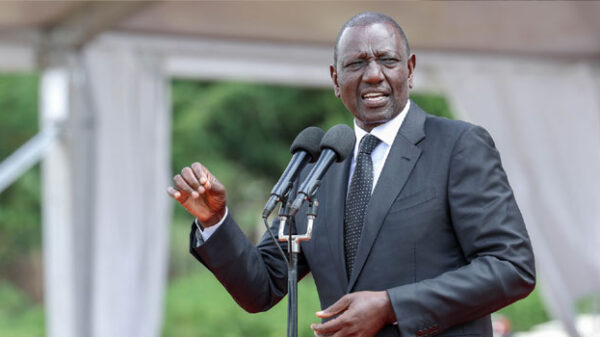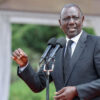While Kenya has several laws and regulations in the extractive industry, a lot of grey areas in these laws and impunity have denied the country and communities where mining is done meaningful benefits. Cases from around the country show that accountability and transparency in the benefit-sharing arrangements and respect to the right of the communities to a healthy environment as provided for in the Constitution is still a major challenge.
With the anecdotal evidence from many African countries where extraction of minerals is happening and the industry characterized by corruption, exclusion of the host communities from benefits, and lack of information on the process including EIAs, benefits to the community and public participation/community concerns, the Government and county governments need to scale up to interventions to enhance public participation, access to information and community protection from harm in these areas. To abandon the communities and allow investors in the industry to violate the rights of communities to a healthy environment will be a big concern and dent the country’s achievement on the SDG requirements.
Both the national and county governments have obligations to support the development of local communities’ capacity to engage with the mining companies regardless of external investments especially in light of the social, economic, and political marginalization of rural most of host communities. They must be actively involved in the process of consultations, agreements and monitoring of compliance to the country laws. While communities can on their own seek redress from courts over the same, it’s the primary responsibility of the Government and the county leadership to enforce laws and especially where rogue companies are infringing on the rights of the communities and their activities threaten the country’s effort to save the environment, forests and ensure food security.
Access to information including on Environmental Impact Assessment reports, community participation and feedback, benefit-sharing, land surrender rights and compensation by the communities, and full disclosure of the details of the production agreement between the government and international investors is basic. These are critical even as the country works on interventions to deal with mitigating the adverse impacts of climate change on communities. I have been reading for example cases from Kilifi County relating to the Salt mining activities in Marereni from when the Kenya National Commission on Human Rights conducted a public inquiry on the human rights violations in the area. Recommendations were made and the Ministry of Labour gave some directives on the same. Several years later, the salt companies are still doing their work in the same way, with impunity and with little concern for the environment and communities living around. It has taken again the intervention of Natural Justice, an international group working on sustainable development issues to start another around of engagement with authorities to save the environment and the communities. It seems in the country, that hosts such important natural resources including the mangrove forest, the kaya forests, the Arabuko forest and the communities living around Boyani areas where quarrying activities are taking place are facing serious challenges with these extractive investors, some even working with public agencies.
Both the right to information and public participation laws require that communities are prioritized in the oil and gas sector or natural resources distribution processes but as its now, things seem not fine and many communities are still to benefit from hosting natural resources. Due to lack of access to information and poor public participation practices by international investors, and the fact that Kenya is yet to join the Extractive Industry Transparency Initiative, knowledge among the host communities on what the benefit sharing and land acquisition processes are still a mirage. Who knows what the current agreements provided for, how much was already pocketed from the extractive industries and what price will guys pay,
A report by Oxfam entitled The Free Prior and informed Consent, (FPIC), some years ago in Turkana on Tullow and Africa Oil’s community engagement approaches, established that many community members are not aware of the existence or contents of the public participation and benefit-sharing documents and residents raised differing understanding of what was agreed with mining companies.
Most of the community engagement strategies to increase public participation and understanding, information sharing and especially in land use or content of production agreements by the international investors are still wanting, and face resistance by the host communities. There are still serious gaps in terms of who monitors implementation of commitments provided in the Corporate Social Responsibilities by the mining companies and who supervises the monitoring of emerging social, environmental effects on the communities in changing dynamics because most of the leaders appointed to represent the community are ill-prepared for the task- they have no full range of potential risks and impacts across the project life cycle – to make informed decisions.
Companies must maintain deep routine and regular monitoring of public engagement and information sharing sessions and events Enforce its contract disclosure requirements to help ensure that communities have adequate information regarding the fiscal terms of agreements reached between companies and governments.
The study, borrowing from international best practices recommends for oil, mining and gas companies to reveal the same basic information about the payments to the state and communities, benefits to citizens and openness and transparency. It recommended that companies must maintain deep routine and regular monitoring of public engagement and information sharing sessions and events so that it’s known what they promised to the host communities.
According to the Kenya Health risk profile (world Bank, 2015), the risk of malaria and other vector-borne diseases are projected to increase in future years due to changing climate conditions. More severe and frequent flooding may displace communities and increase the risk of water-borne diseases, and higher temperatures may threaten food and nutritional security, agricultural livelihoods, and increase heat-related deaths in the elderly.
The writer is the Deputy CEO at the Media Council of Kenya.

























































